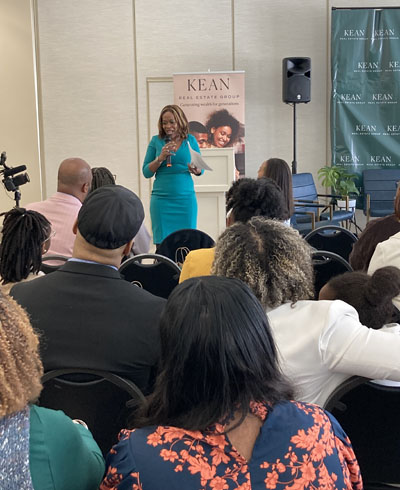By Neil Armstrong
Contributing Editor
BRAMPTON, Ontario (Wednesday, March 8, 2023) — A Jamaican-Canadian professor wants Black Canadians, who have succeeded in life, to reimagine how they can help others, who are not their relatives and, in doing so, generate wealth in the Black community.
In her presentation, titled “Reimagining Generational Wealth Beyond Biological Imperatives”, Dr. Karen Flynn, associate professor in the Department of Gender and Women’s Studies, the Centre for African Studies at the University of Illinois, Urbana-Champaign, said while she is interested in generational wealth, she is “also interested in assisting those non-biological cousins and who the Bible refers to “as the least of these”, because inequality is real and also has global dimensions.”
She was the keynote speaker at the third staging of the event, Building Generation Wealth, on February 23, by Brampton-based Kean Real Estate Group, which aims to improve home and investment ownership among Black, Indigenous, and People of Colour (BIPOC) communities.
Dr. Flynn said when she migrated to Canada from Jamaica in her early teens, her father often reminded his children that “this is a white man’s country,” and his children were expected to get a good education.
“At the time, I understood the education component. I was less clear about the white man’s country admonition. However, in the early 1990s, while pursuing a master’s degree, I came across the article, “White Man’s Country: Canada and the West Indian Immigrant, 1900-1965,” written by John Shultz.” His title was influenced by something William Lyon Mackenzie King, Canada’s longest-serving prime minister, said while he was deputy-minister of labour in 1908.
King argued against the immigration of Asians, saying: “That Canada should desire to restrict immigration from the Orient is regarded as natural, that Canada should remain a white man’s country is believed to be not only desirable for economic and social reasons, but highly necessary on political and national grounds.”
Dr. Flynn noted that it was not just Asian people, who were prohibited from migrating to Canada; Black people were also viewed as inadmissible.
“The most egregious policy, designed to restrict Black migration, was the order-in-council signed on August 12, 1911, by Sir Wilfred Laurier. Fortunately for us, this order in council fell through the cracks of the federal government turnover in the fall of 1911. Of course, in 1923, the Canadian government would pass the racist Chinese Immigration Act, which banned Chinese immigration. The reality is that Brown and Black people were not meant to be on Canadian soil. Indeed, until 1962 and 1967 respectively, restrictive immigration policies were the norm,” she pointed out.
Using these restrictive immigration policies to provide the context for her presentation, Dr. Flynn made the case for rethinking generational wealth beyond biological imperatives to include the community and other activities.

She said meritocracy is a myth, due to historical and ongoing systemic barriers, but despite these obstacles, “we, as a community, have and continue to harness our social and cultural capital as the basis for generational wealth.”
Dr. Flynn noted that Black Canadians were abysmally affected by established legal ordinances that prohibited them from owning land and buying homes. They also faced discrimination in areas of public life.
As she continued studying Black life in Canada, the professor said she came to see how narrow the search of a better life narrative is, in relation to Caribbean immigrants.
“This narrative paints Canada as an altruistic nation, which welcomes migrants who stand to benefit from improved economic conditions, leading to upward mobility. Downplayed in this well-established script, are the advantages Canada receives from Caribbean migrants, the very same people, who this nation relentlessly worked to exclude.”
She referenced Caribbean domestic workers — who raised the kids of middle-class white women who left their homes to enter the world of paid work — and thus contributed to the nation-building project.
“Indeed, when there was a shortage of healthcare workers, following the Second World War, it was the Caribbean that the government and hospitals looked to, to alleviate the labour problem. Canada benefited from health care workers, who were already trained.”
She also mentioned Canada’s recruitment of Caribbean seasonal workers to fill the need for labourers on farms.
She said Black people have harnessed their social and cultural capital to ensure their survival, which is visible in the organizations Black Canadians and Caribbean people established.
These included the Coloured Women Club of Montreal (CWCM), founded in 1902, to assist with the 1918 flu epidemic. Its members volunteered as visiting nurses and nurses’ aides.
The Negro Citizenship Association that Barbadian Donald Willard Moore established in 1951, was another example. A social and humanitarian organization, the NCA fought relentlessly to challenge Canada’s racist immigration policies, which it said, denied equal immigration status to non-white British subjects.
In 1956, Moore and two other members of the NCA purchased a 12-room house on Cecil Street and converted it into a recreation centre for the West Indian community called Donavalon Centre.
This was Dr. Flynn’s first example of reimagining generational wealth beyond biological family members. “What, if, instead of a plaque, the Caribbean community still owned that centre, some 67 years later? We can imagine the possibilities.”
She commended her best friend, Andrea Peart Williams, for partnering with Kemba Williams to create Kean Real Estate Group, and for encouraging friends 20 ago, to consider pooling their money together for investmentpurposes.
“Canada has been good to some of us, as well as our parents, evidenced by our material and economic success. At the same time, statistics tell a story that we can’t afford to ignore.
“For those of us who have the resources, it is contingent on us to follow in the footsteps of those who have gone before. The Bible reminds us that to whom much is given, much is required. We have the cultural and social capital necessary to make the change. We are the change,” she said.
 Pride News Canada's Leader In African Canadian & Caribbean News, Views & Lifestyle
Pride News Canada's Leader In African Canadian & Caribbean News, Views & Lifestyle






